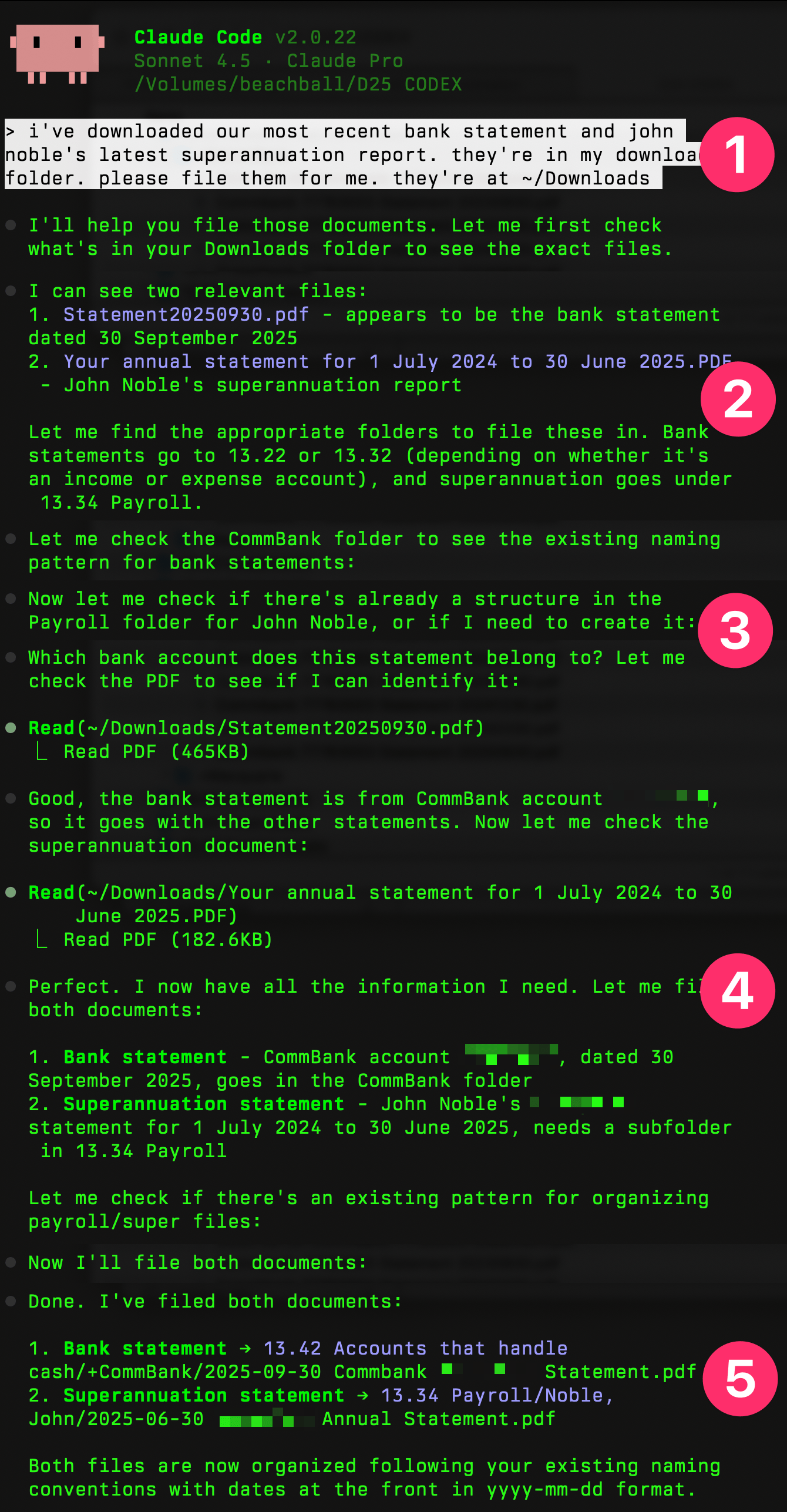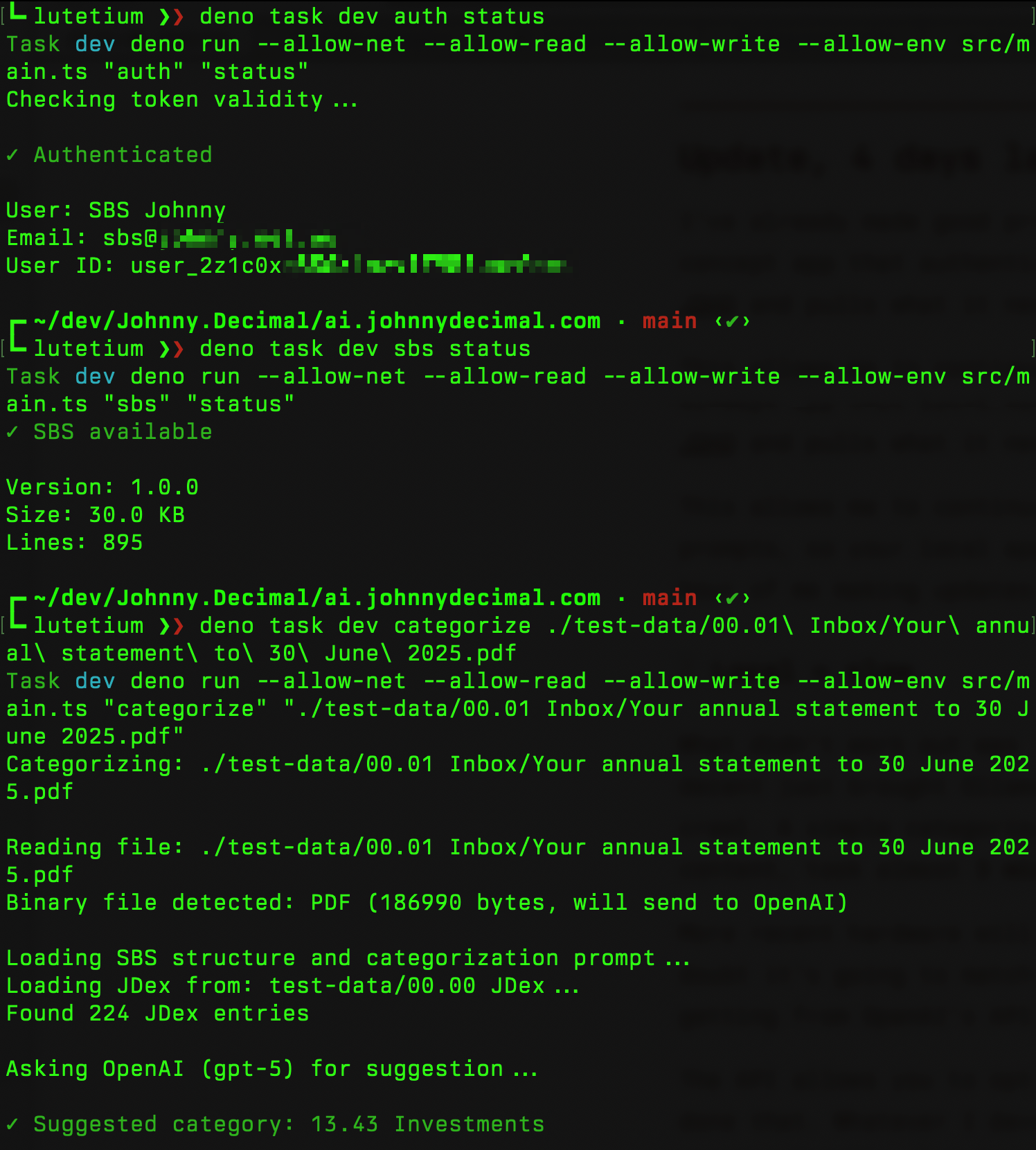Automated organisation?
Today's post was sent to the mailing list 4 days ago. Sign up for the occasional early treat.
Hi, Decimals. This one's going out [to the list] a few days before I put it on the blog. I'm looking for organisations that might be interested in testing this out at scale. Is that you? Let me know, I'll prioritise responses from this list.
I loathe much of 'generative AI', and you'll never read a word of mine that was written by a machine. But to deny its usefulness in other situations feels dogmatic. One of those situations is in the automation of repetitive tasks: exactly the sort of thing that computers are good at.
We spent months creating the Small Business System so that you don't have to. But a hurdle remains: the effort in implementing it! And, unless you happen to be me, organising information isn't your business. It's an overhead.
So what if the machine could do it for us? I see new apps every day that promise to organise your stuff using AI, but without a framework, they're all just guessing. The results are going to be different every time. They're not going to be internally consistent. It might look neater but you still won't know, with total confidence, where everything is.
Would that be different if you gave the machine access to a 55,000-word business operations manual, along with clear instructions on the Johnny.Decimal structure and its various patterns and standards? Well I have those things, so let's see.
I downloaded two files: our latest bank statement, and my latest superannuation report. Both filenames were left unchanged. Then I asked Claude:
"i've downloaded our most recent bank statement and john noble's latest superannuation report. they're in my downloads folder. please file them for me."
Here's what happened.

-
There's my instruction.
-
Claude reads the folder, identifying the files. It immediately knows which JD ID these documents should go in, because the basic structure of the system is in-memory.
-
I've given it extra patterns, like the fact that some subfolders need to be organised according to staff member. So it checks whether those structures exist. It reads the contents of the files so that it can be sure they're going to the right place.
-
Comfortable that it knows what to do, it moves both documents, creating a subfolder for me in the payroll folder, and renaming them according to my specified standards.
-
And wraps up by confirming what it did.
I've cleaned up this screenshot (you don't need to see it listing folders on my drive), but this was a 'one-shot' action: it didn't ask me any follow-up questions after my initial prompt. It just worked.
This is pretty good! I'd want to wrap a bunch more controls around it before I set it loose on my business, e.g.
- All file operations must be logged. If it moved something, you want to know what it was before and after.
- I wouldn't be letting this run on an entire unorganised structure in 'move files' mode. I'd be getting it to copy everything over to a new structure that we could then verify.
- There are a bunch more JD-level heuristics I need to add. But for a first crack, a proof of concept … I think the concept is proven?
The nice thing about this is that we're still 100% useful without the AI. It's not a requirement of an ongoing system – it's a tool we can call on as required. We can have it make notes in our JDex so that we can both understand what's going on: it can refer to its own notes in the future, so it'll reinforce its own patterns. And you can refer to those notes just like any other JDex entry without having the AI in the loop.
And of course we can run this on local models so we're not sending our data up to the cloud, provided we have the hardware for it. (My M1 MacBook Air, not so much.)
I'm going to keep working on this. Would you use it? Would you pay for it?… ;-)
Update, 4 days later
I've already made good progress. I have a proof-of-concept app that authenticates against your account at JDHQ and pulls what it needs from an API endpoint.
This allows me to continually refine the system and its prompts, so your local app will be 'smarter' within an hour of me making updates.

Local = slow
What didn't work out was the local model. Even tiny models brought Ollama on my M1 MacBook Air to a crawl. A simple categorisation by filename, not even file content, took almost 3 minutes -- clearly impractical.
More recent hardware will fare better of course, but I doubt it's going to match the sub-2-second response I'm getting from OpenAI's API running gpt-5.
The API allows you to opt-out of data sharing, so I've done that. Whatever I develop will have the option of running locally, but personally I'm in the cloud for now.
(I need to feed it a decent amount of context so that it understands what to do. Splitting the job up into smaller tasks might also help.)
I'm optimistic
I heard from a bunch of people by email and the theme was clear: we'd love to be more organised, but we don't have the time.
This has legs. Watch this space.
100% human. 0% AI. Always.1
Footnotes
-
As in, the words written here will never be generated by AI. My policy on the use of AI is documented at 01.03 Policies. TL;DR: I'll use them where they're useful. ↩